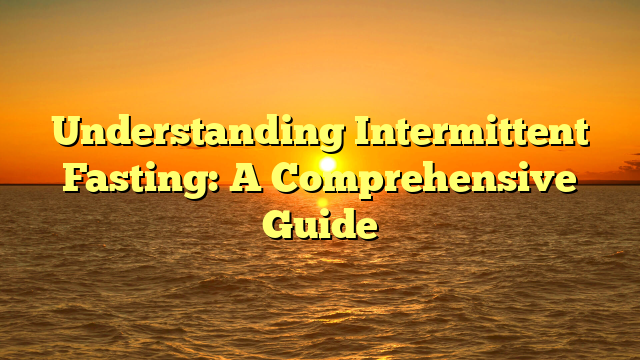Understanding Intermittent Fasting: A Comprehensive Guide
Understanding Intermittent Fasting: A Comprehensive Guide
You’ve heard about intermittent fasting and its potential health benefits, but do you truly understand what it is and how it works? Look no further than “Understanding Intermittent Fasting: A Comprehensive Guide.” In this article, we break down the concept of intermittent fasting step by step, exploring its various methods and the science behind them. Whether you’re a beginner looking to explore this fasting trend or a seasoned intermittent faster seeking to deepen your knowledge, this guide provides you with all the information you need to navigate the world of intermittent fasting successfully.
What is Intermittent Fasting?
Definition of Intermittent Fasting
Intermittent fasting is an eating pattern that alternates between periods of fasting and eating. It does not focus on what foods to eat, but rather on when to eat them. During the fasting periods, no or minimal caloric intake is allowed, while during the eating periods, normal or slightly reduced caloric intake is followed. This eating pattern does not restrict certain food groups but emphasizes the timing of meals.
History of Intermittent Fasting
Fasting has been practiced throughout history for various reasons, including religious and spiritual purposes. The concept of intermittent fasting has been around for centuries and has been observed in different cultures and religions, such as Islam, Christianity, and Buddhism. In recent years, intermittent fasting has gained popularity as a potential approach for weight loss and overall health improvement.
Different Approaches to Intermittent Fasting
There are several different approaches to intermittent fasting, each with its own unique fasting and eating windows. Some popular methods include the 16/8 method, where you fast for 16 hours and have an 8-hour eating window; the 5:2 diet, which involves eating normally for five days and severely restricting calories for two non-consecutive days; alternate-day fasting, where you fast every other day or limit intake to 500-600 calories; eat-stop-eat, which involves a 24-hour fast once or twice a week; warrior diet, where you fast for 20 hours and have a 4-hour eating window; and spontaneous meal skipping, where you simply skip the occasional meal when you’re not hungry.
Benefits of Intermittent Fasting
Weight Loss and Fat Burning
One of the main benefits of intermittent fasting is its potential for weight loss and fat burning. By limiting the eating window, it becomes easier to create a calorie deficit, leading to weight loss. Additionally, fasting can help kickstart ketosis, a metabolic state where the body primarily burns fat for energy.
Improved Insulin Sensitivity
Intermittent fasting has been shown to improve insulin sensitivity, which is the body’s ability to respond to and process glucose. This can be especially beneficial for individuals with insulin resistance or prediabetes. By improving insulin sensitivity, the body can better regulate blood sugar levels and reduce the risk of developing type 2 diabetes.
Cellular Repair and Autophagy
During fasting periods, the body undergoes a process called autophagy, where damaged cells are broken down and recycled. This cellular repair mechanism helps remove toxins, reduce inflammation, and can potentially reduce the risk of certain chronic diseases, including cancer and neurodegenerative disorders.
Reduced Inflammation
Intermittent fasting has been shown to reduce inflammation in the body. Chronic inflammation is believed to be a contributing factor to various health issues, including heart disease, diabetes, and obesity. By reducing inflammation, intermittent fasting may help improve overall health and reduce the risk of these conditions.
Enhanced Brain Health
Intermittent fasting has shown potential benefits for brain health and neuroplasticity. It may promote the production of brain-derived neurotrophic factor (BDNF), a protein that supports the growth and development of new neurons. This, in turn, may improve cognitive function, memory, and mood.
Longevity and Anti-Aging Effects
Some studies suggest that intermittent fasting may have potential anti-aging effects and promote longevity. Caloric restriction, which is an underlying principle of intermittent fasting, has been shown to extend lifespan in various organisms. While more research is needed, intermittent fasting shows promise in this area.
Types of Intermittent Fasting
16/8 Method
The 16/8 method involves fasting for 16 hours and having an 8-hour eating window. This method is popular and can be easily incorporated into a daily routine. The fasting period usually includes overnight hours, such as skipping breakfast and starting eating at noon.
5:2 Diet
The 5:2 diet involves eating normally for five days of the week and severely restricting calories (around 500-600) for two non-consecutive days. This method allows for flexibility in food choices and may be suitable for those who prefer less frequent fasting periods.
Alternate-Day Fasting
Alternate-day fasting involves fasting every other day or limiting calorie intake to 500-600 calories on fasting days. This method can be more challenging than others, but it allows for a full day of unrestricted eating between fasting periods.
Eat-Stop-Eat
Eat-stop-eat involves a complete 24-hour fast once or twice a week. For example, you may have dinner one day and then fast until dinner the next day. This method requires more willpower and may not be suitable for everyone, but it can be effective for weight loss and autophagy promotion.
Warrior Diet
The warrior diet involves fasting for 20 hours and having a 4-hour eating window each day. During the fasting period, small amounts of raw fruits and vegetables can be consumed. This method may suit individuals who prefer to have one larger meal at the end of the day.
Spontaneous Meal Skipping
Spontaneous meal skipping is a flexible approach where you simply skip a meal or two when you’re not hungry. This method allows for intuitive eating and can be easily adapted to your specific schedule and appetite.
Getting Started with Intermittent Fasting
Consulting a Healthcare Professional
Before starting any new dietary approach, it’s important to consult with a healthcare professional, especially if you have any underlying health conditions or are taking medications that may be affected by fasting. They can provide guidance and tailor a plan that suits your individual needs.
Setting Realistic Goals
Setting realistic goals is essential when starting intermittent fasting. It’s important to have a clear understanding of what you hope to achieve and to approach it with patience and a long-term mindset. Sustainable weight loss and overall health improvements take time.
Choosing the Right Intermittent Fasting Method
When choosing an intermittent fasting method, consider your lifestyle, preferences, and schedule. Select a method that you feel comfortable with and that fits seamlessly into your daily routine. Experiment with different approaches until you find the one that works best for you.
Preparing Mentally and Emotionally
Intermittent fasting can be challenging, especially in the beginning. It’s important to mentally and emotionally prepare yourself for potential hunger pangs, cravings, and adjustments to your eating habits. Practice mindfulness and develop strategies to cope with these challenges.
Planning and Scheduling Meals
Planning and scheduling meals can help ensure you have balanced and nutritious meals during your eating windows. Aim to include a variety of whole foods, including fruits, vegetables, lean proteins, and healthy fats. Proper meal planning can also aid in managing hunger and preventing overeating.
Monitoring Progress and Adjusting
Keep track of your progress while practicing intermittent fasting. Monitor how your body feels, your energy levels, and any changes in weight or health markers. If needed, make adjustments to your fasting method or eating habits to optimize your results.
Common Mistakes and Challenges in Intermittent Fasting
Excessive Caloric Intake during Eating Windows
One common mistake is compensating for the fasting period by consuming excessively large meals or indulging in unhealthy foods. This can hinder weight loss efforts and negate the potential benefits of intermittent fasting. Focus on nutrient-dense, balanced meals during the eating windows.
Inadequate Hydration
Staying hydrated is essential during intermittent fasting. Many people overlook the importance of drinking enough water throughout the day. Aim to drink an adequate amount of water, herbal tea, or other non-caloric beverages to prevent dehydration and support overall health.
Ignoring Nutritional Requirements
While intermittent fasting does not restrict specific food groups, it’s still important to prioritize nutrient-dense foods. Ensure you’re still meeting your body’s nutritional requirements by including a variety of fruits, vegetables, whole grains, lean proteins, and healthy fats in your meals.
Overeating or Binge-Eating
It can be tempting to overeat or indulge in unhealthy foods during the eating windows, especially if you’ve been restricting calories during the fasting periods. Practice mindful eating and listen to your body’s hunger and fullness cues to avoid overeating or falling into binge-eating patterns.
Lack of Consistency
Consistency is key when practicing intermittent fasting. Skipping fasting days or changing eating patterns frequently can disrupt the body’s natural rhythm and make it more challenging to reap the benefits of this eating pattern. Stick to a consistent fasting and eating schedule to optimize results.
Social and Psychological Challenges
Intermittent fasting may present social and psychological challenges, especially in social gatherings or situations where food is involved. It’s important to communicate your dietary choices to friends and family and find strategies to navigate these situations without compromising your fasting goals.
Potential Risks and Precautions
Effects on Blood Sugar Levels
Intermittent fasting can affect blood sugar levels, particularly in individuals with diabetes or other blood sugar regulation issues. It’s important to monitor blood sugar levels closely and consult with a healthcare professional to adjust medication and manage blood sugar effectively.
Contradictions for Certain Health Conditions
Intermittent fasting may not be suitable for everyone, especially those with certain health conditions, such as eating disorders, diabetes, or other metabolic disorders. Consulting with a healthcare professional is crucial to assess whether intermittent fasting is appropriate for your specific condition.
Potential Impact on Hormonal Balance
Intermittent fasting can impact hormonal balance, particularly in women. It may affect menstrual cycles and fertility in some individuals. Women should be cautious and pay attention to any changes in their menstrual cycles or hormonal health when practicing intermittent fasting.
Deficiencies in Essential Nutrients
Restricting food intake during certain periods can increase the risk of nutrient deficiencies if not properly managed. It’s important to ensure you’re consuming a well-balanced diet during the eating windows and to consider supplementation if needed to meet nutritional needs.
Adverse Effects on Mental Health
For some individuals, intermittent fasting may have adverse effects on mental health, such as increased anxiety, obsessive thoughts about food, or feelings of guilt or failure. If you experience any negative impacts on your mental health, it’s important to seek professional support.
Intermittent Fasting and Exercise
Timing of Workouts
Timing workouts can be important when practicing intermittent fasting, as some individuals may feel more energized and perform better during the fasted state, while others may prefer to exercise after a meal. Experiment with different timings to find what works best for your body and goals.
Types of Exercises for Fasted State
For individuals exercising in the fasted state, low- to moderate-intensity exercises such as walking, yoga, or light cardio can be beneficial. These activities help burn fat for fuel and are less likely to cause muscle breakdown compared to high-intensity workouts.
Importance of Rest and Recovery
Rest and recovery are crucial components of any fitness routine, including intermittent fasting. Ensure you’re getting enough quality sleep, taking rest days when needed, and practicing stress management techniques. This will help optimize performance, prevent injury, and support overall well-being.
Hydration and Electrolyte Balance
Maintaining proper hydration and electrolyte balance is essential when exercising, especially during fasting periods. Drink enough water and consider incorporating electrolyte-rich foods or supplements to support hydration and replenish essential nutrients.
Tips for Successful Intermittent Fasting
Staying Hydrated
Remember to drink enough water throughout the day to stay adequately hydrated. Aim for at least 8 cups (64 ounces) of water per day, or more if you are physically active or in a hot climate. Hydration is important for overall health and can help manage hunger during fasting periods.
Consuming Nutrient-Dense Foods
Focus on consuming nutrient-dense foods during your eating windows. Include a variety of fruits, vegetables, whole grains, lean proteins, and healthy fats to ensure you are meeting your nutritional needs. These foods provide essential vitamins, minerals, and antioxidants to support optimal health.
Including Healthy Fats and Proteins
Including healthy fats and proteins in your meals can help increase satiety and keep you feeling fuller for longer. Good sources of healthy fats include avocados, nuts, seeds, and olive oil. Lean proteins can come from sources such as poultry, fish, tofu, and legumes.
Managing Hunger and Cravings
During fasting periods, it’s normal to experience hunger pangs and cravings. To manage hunger, stay hydrated, consume fiber-rich foods, and consider incorporating savory snacks like pickles or bone broth. If cravings arise, opt for healthier alternatives or practice mindful eating techniques.
Maintaining a Balanced Lifestyle
Intermittent fasting should be seen as part of a balanced lifestyle. Incorporate regular physical activity, prioritize stress management, and ensure you’re getting enough quality sleep. Remember to enjoy social outings and special occasions without feeling guilty, as long as it’s done in moderation.
Listening to Your Body’s Signals
It’s essential to listen to your body and adjust your fasting and eating patterns accordingly. If you feel unwell, excessively fatigued, or experience any negative health effects, it’s important to reevaluate and seek professional guidance. Everyone’s needs are unique, so it’s crucial to prioritize self-care.
Intermittent Fasting and Women
Considerations for Female Hormonal Health
Women may need to take additional considerations when practicing intermittent fasting due to its potential impact on hormonal health. Some women may experience changes in menstrual cycles, hormonal imbalances, or mood fluctuations. It’s important to monitor these changes and consult with a healthcare professional if needed.
Intermittent Fasting during Pregnancy and Breastfeeding
Intermittent fasting is generally not recommended during pregnancy and breastfeeding, as it can potentially affect the nutritional needs of both the mother and the developing baby. It’s important to prioritize a well-balanced diet during these periods to ensure adequate nutrient intake.
Effects on Menstrual Cycle and Fertility
Intermittent fasting may affect the regularity of menstrual cycles in some women. It’s important to pay attention to any changes in menstrual cycle length, flow, or symptoms. If any concerns arise, consult with a healthcare professional to determine the best approach for your individual needs.
Adjustments for Women’s Unique Needs
Women may need to make adjustments to their intermittent fasting approach based on their unique needs and health goals. It may be beneficial to have more flexible eating windows or shorter fasting periods to support hormonal health and overall well-being.
Frequently Asked Questions about Intermittent Fasting
Can I Drink Coffee or Tea during Fasting?
Yes, you can drink coffee or tea during fasting periods, as long as it’s consumed without added sugars, cream, or milk. Black coffee and plain herbal teas are calorie-free and won’t break your fast. However, avoid excessive caffeine intake or adding high-calorie additives that may interfere with the fasting process.
Can I Take Medications or Supplements?
It’s generally safe to continue taking prescribed medications and supplements while practicing intermittent fasting. However, it’s essential to consult with a healthcare professional to ensure there are no specific interactions or concerns regarding your medication or supplement regime.
Will Intermittent Fasting Slow Down Metabolism?
Intermittent fasting does not inherently slow down metabolism. In fact, intermittent fasting can potentially increase metabolic rate by promoting fat burning and preserving lean muscle mass. However, severe calorie restriction or prolonged fasting periods may lower metabolic rate, so it’s important to find a balanced approach.
Can I Do Intermittent Fasting While Traveling?
Yes, intermittent fasting can be practiced while traveling. It may require some flexibility in adjusting fasting and eating windows to accommodate different time zones and travel schedules. Planning ahead, having convenient food options, and staying hydrated are important factors to consider when traveling.
Is Intermittent Fasting Suitable for Everyone?
Intermittent fasting may not be suitable for everyone, especially those with certain health conditions or unique nutritional needs. It’s important to consult with a healthcare professional if you have any concerns or questions about whether intermittent fasting is appropriate for you.







